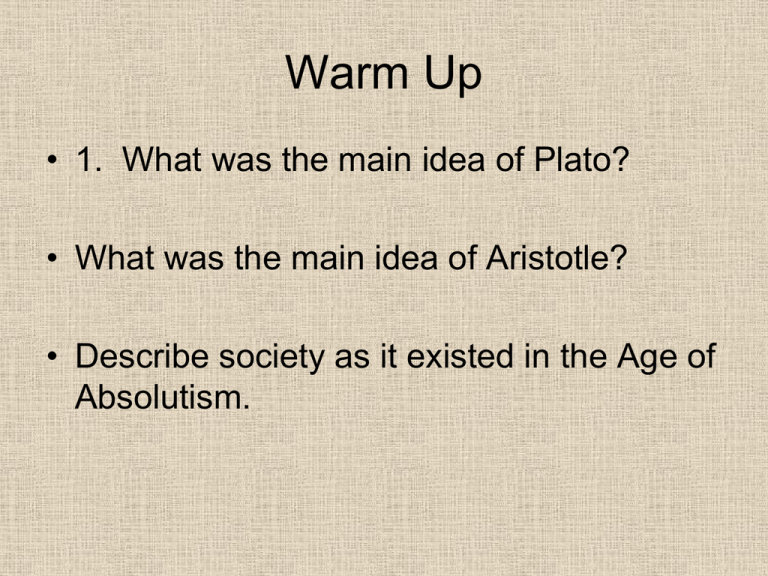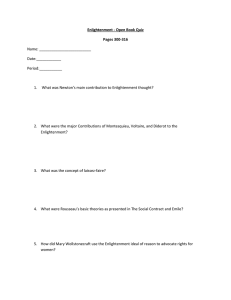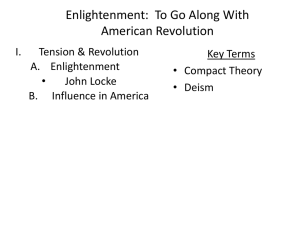Warm Up
advertisement

Warm Up • 1. What was the main idea of Plato? • What was the main idea of Aristotle? • Describe society as it existed in the Age of Absolutism. Test Review • King John was a bad king. The people made him sign the Magna Carta. • What are rights? • How do you get your rights? • How do you think people came up with the idea of rights? The Enlightenment What is it? • It happened in Europe • In happened in the 18th Century (1700s). • Emphasized reason over faith and superstition • Started a new way of thinking about the rights of humans. Setting the Stage • In the 1600s Europe is ruled by absolute monarchs. • Absolute monarchs do whatever they want. • Rich live in splendor • Everybody else is generally living bad • Things are not fair; there are different rights for different classes of people. • How do people get rich and poor? French Palace of Versailles Nobles • Nobles are rich people who have titles like: Duke, Lord, & Earl. • They own lots of land. • They don’t work. • Get to advise the Monarch and vote. • They are rich but usually pay no taxes. The Clergy • Church Officials. • Are very powerful. • Own lots of land. • Supported by Kings and Queens, • Usually don’t have to pay taxes. Various Clergy The Poor • Most people were poor peasants. • They usually worked as farmers. • They lived in poor conditions and had to pay a lot of taxes. • Don’t get to vote or participate in Govt. Church’s Support the Ancient Regime • Most European churches—Catholic and Protestant (Christian)—are supported by the monarchs of each country. • Churches get special rights and don’t have to pay taxes. • In return, churches tell people to support monarchs and accept how things are. • The Church is also the authority on explaining the universe, etc. Scientific Revolution • During the 1500s and 1600s, scientists made new breakthroughs that helped explain the universe and the world. • Copernicus —Heliocentric theory of universe. • Kepler—planets travel in elliptical orbits. • Galileo—Astronomy (planets are imperfect). • These discoveries often angered the Catholic Church because they contradicted their teachings. • . Isaac Newton • English Mathematician • Newton’s studies on gravity led to an understanding of motion in the universe. • Led to the idea of universal laws that explained how everything worked. Influence of the Scientific Revolution • Since there are universal rules that explain the universe, through reason, people could arrive at natural laws that governed society. • If one uses reason, one can figure out how to improve society. • Based on Locke’s assumptions on human understanding. Stop • How do people know the difference between right and wrong? • Why are people racist? • What does Locke say? • Do you agree? Warm Up • What was the scientific revolution? • How did the scientific revolution lead to new ways of thinking about humans and society? • Explain John Locke’s theory on human understanding. Locke’s New Assumptions on Human Nature and Understanding • Humans—regardless of time and place— are essentially rational. • Understanding comes from experience and rational analysis. • Thus, if properly enlightened, one should arrive at what is right. What was the Enlightenment? • An intellectual movement in the 18th century that sought to improve society by emphasizing reason and “natural rights” (over faith and superstition) . • Also called “The Age of Reason”. • Is about applying reason to improve society (the environment) and thus improve human behavior. Natural Rights • Enlightenment thinkers believe that everybody has “natural rights.” • Natural rights = Rights as human beings • Ex = life, liberty, and property. • Enlightenment thinkers say that these are rights that governments can’t give or take away. Review • How did the Scientific revolution lead to the Enlightenment? • What did John Locke believe about human understanding? • Explain the idea of natural rights. • How did figures of the Enlightenment believe the could improve society? The Enlightenment Begins • Primarily in Western Europe. • A lot in France. • Printing Press plays a role. The Enlightenment in France • Take part in “Salons.” Parlors of wealthy women who invite people over to discuss the Enlightenment ideas. • In France, Enlightenment thinkers are called “Philosophes.” Deism • Most Enlightenment figures are deists. • Belief in God, but not in religion • God is a “watchmaker.” • Most Enlightenment figures are against churches. Warm Up • What was the Enlightenment? • Where did it primarily take place? • What role did women play in the Enlightenment? • What are “natural rights”? • What was the French word for the Enlightenment Thinkers? • Explain Deism. The Encyclopedia • Denis Diderot • Created the first Encyclopedia. During the Enlightenment • People began to think that government and society should be changed to make people’s lives better.


